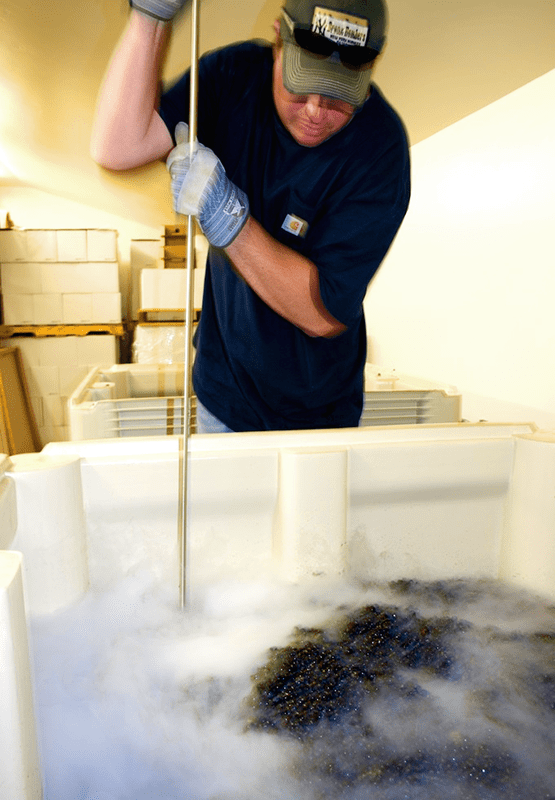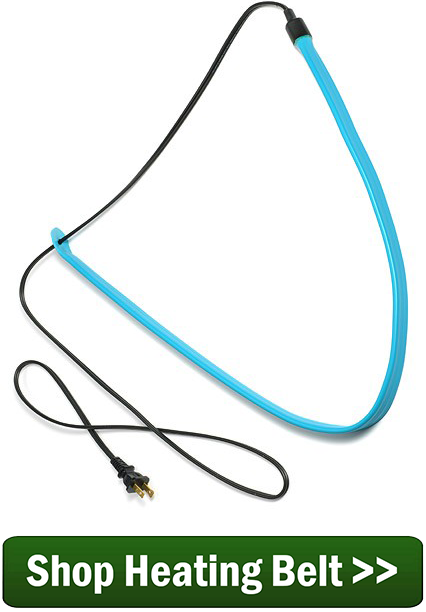 I am a newbie to wine making. I understand the primary fermentation temp should be 65-75? How about the secondary fermentation and subsequent processes? I am wanting to make my wine in my basement but it might be too cool.
I am a newbie to wine making. I understand the primary fermentation temp should be 65-75? How about the secondary fermentation and subsequent processes? I am wanting to make my wine in my basement but it might be too cool.
Thanks.
Todd
—-–
Hello Todd,
This is a great question. The answer to it is quite often what trips up many beginning home winemakers.
The effect that temperature has on a wine fermentation is enormous and greatly underestimated by many. This is particularly true for those new to wine making. As an example to the enormity of its effect, consider the 65°F. you mentioned above. This might allow a wine fermentation that is barely noticeable to occur, whereas the 75°F. you mentioned might end up producing a fermentation that results in a spewing volcano of foam. That’s how dynamic temperature can be to a wine fermentation.
The type of wine yeast you use, along with the wine you are fermenting and a whole host of other, more minor, variables also factor into how dramatic this comparison plays out, but without a doubt fermentation temperature is always vital enough to make your question an important one.
Whether or not your wine must is in a primary fermenter or secondary fermenter is not what matters to the temperature you maintain. What does matter are the readings you are getting with your wine hydrometer.
You will eventually want to keep your wine at a little cooler temperature than what you previously mentioned, but you also want the fermentation to be complete before moving the wine to these cooler temperatures. You determine if a fermentation is done by taking a hydrometer reading, not by whether or not it is in a primary or secondary fermenter.
Sometimes the fermentation finishes while it is still in the primary fermenter. Sometimes the fermentation carries on for a great deal of time while it is in the secondary fermenter. The reason for this inconsistency is because of all the variables mentioned before: yeast strain, type of wine, etc.
 You can read more about checking the fermentation with a hydrometer in the article, Getting To Know Your Hydrometer, listed on our website. You may also want to check out, How To Know If Your Fermentation Is Done.
You can read more about checking the fermentation with a hydrometer in the article, Getting To Know Your Hydrometer, listed on our website. You may also want to check out, How To Know If Your Fermentation Is Done.
Even though you suggested wine fermentation temperatures between 65°F. and 75°F., we recommend between 70°F. and 75°F. Once you get below 70°F. some wine yeast strains have a tendency of dragging out the fermentation.
Once the fermentation has completed, and this has been verified with a wine hydrometer, you can maintain a lower temperature. An optimal temperature for storage would be 55°F., but it is not extremely critical. Just do the best you can to keep it out of warm temperatures once the fermentation has completed. What’s more important is that the temperature be even and not be all over the place while the wine is in storage.
Thank you for your great question on wine fermentation temperature. Just remember that you should have some type of control of the temperature. You do not want the fermentation to be too low or too high, but just right. I hope this information helps you out.
Best Wishes,
Ed Kraus
—–
Ed Kraus is a 3rd generation home brewer/winemaker and has been an owner of E. C. Kraus since 1999. He has been helping individuals make better wine and beer for over 25 years.

i kno different yeast have different temperature ranges…some into the 80s and 90s even. the yeasta with higher ranges…would 70 degrees still be reccomended? im in ca and its hard to maintain 70 degree temps without using an air cooler (which isnt cost effective). what effect does higher temps have on wine? does it depend on the fruit?
Willie, with most wine yeast it is our experience that fermentations that are too warm can perform poorly. And in extreme cases–85 degrees and above–the wine yeast cells may become damaged, inhibiting their ability to ferment. However if the wine does ferment okay at a higher temperature, that is not the only thing you need to worry about. If the fermentation temperature is too warm, the yeast may ferment fine, but the flavor of the wine will usually suffer. This is because of the increased production of unwanted enzymes by the yeast and the possible growth of micro-organisms that thrive in warmer temperatures. This could result in off-flavors in your wine and in extreme cases complete spoilage.
I am in a bind for time. My grapes are ready but I am not. Can I freeze my grapes and still use them to make wine? Should I do anything special if I freeze them? Please help.
David, yes you can absolutely freeze your grapes. There are actually benefits from doing so. The following article will discuss the in more detail.
Freezing Wine Making Fruit
http://blog.eckraus.com/freezing-wine-making-fruit
I come from an old fashioned Italian family that has been making homemade wine for a long time. I was taught to do very little during the process and to let the wine naturally start fermentation. No yeast added. I use a hydrometer to measure progress. So far this has worked for me and I have been proud of the results. However, last year my wine struggled and developed a foul smell. This year, for the first time in 12 years, I am adding yeast to the process. I was told the foul smell was due to the wine being malnourished. Does not using yeast cause too much stress to the wine?
Joseph, using wine yeast does not cause stress to the wine. Neither does having too much wine yeast. I would take a look at the article below on the benefits of using wine yeast as opposed to wild yeast.
Should I Use Wine Yeast
https://eckraus.com/why-should-i-use-wine-yeast/
My red wines fermenting at a steady 18 degrees is this too cold?
Just a little too cool. I would suggest warming it up to 22C so that the yeast can finish out the fermentation more completely.
I just purchased cold wine juice. My late father in law, used to boil of juice and then put it in the barrel. Is that a good practice?
Thomas, we do not recommend boiling the wine making juice. It could cause the juice to oxidize.